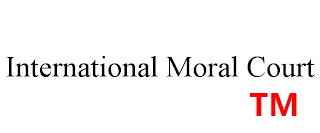The International Moral Court FAQ - World Credit Organization

The International Moral Court FAQ
Important notice: The International Moral Court is an independent and purely non-governmental organization, not a state agency or government agency or semi-official organization, nor does it have any national or government background. In order to guarantee independence and neutrality, the International Moral Court does not intend to obtain the background of any country or government. At the same time, and precisely because of this, fairness and justice are the basis for the survival and development of the International Moral Court.
Dear readers, let us distinguish right from wrong, punish evil and promote good, and jointly maintain the moral foundation of mankind! We need your support!
1. Does the International Moral Court’s judgment have legal effect?
Answer: The judgments issued by the International Moral Court do not have legal effect and are considered non-binding opinions and recommendations. They are not legal rulings. The parties involved are free to decide whether or not to comply. Furthermore, if a party believes the judgment is unfair, they have the right to publicly release a statement explaining their reasons for non-compliance.
2. If the International Moral Court’s judgments have no legal effect, why would parties choose to comply?
Answer: Whether people choose to voluntarily comply with a judgment depends on whether the judgment is perceived as fair and reasonable. If a party voluntarily complies with a fair and reasonable moral judgment, it demonstrates that the party possesses high moral character. Conversely, if a party refuses to comply with a clearly fair and reasonable judgment, it suggests low moral standing. In such cases, business partners and stakeholders—seeking to minimize their own risk—may choose to limit or terminate cooperation with the non-compliant party.
3. Why does the International Moral Court strive for fairness and reasonableness?
Answer: The International Moral Court is an independent, non-governmental adjudication body with no official or governmental affiliation. Fairness and reasonableness are the very foundation of its moral authority and existence. Since its judgments do not carry legal force, if they were also unfair or unreasonable, the Court would lose all credibility and moral persuasive power. Moreover, parties have the right to publicly disclose their reasons for non-compliance, allowing the public to judge whether the Court’s decision is truly just and reasonable.
4. Is the International Court of Ethics legal? How to check the registration information of the International Moral Court?
Answer: Of course it is legal. According to the constitutional principles of freedom where there is no prohibition of the law, the constitutional principles of freedom of speech, and the principles of public order and good customs, the International Moral Court is very legal. If you do not recognize the legitimacy of the International Moral Court, people will think to a certain extent that you do not understand or recognize or do not know the "constitutional principles of freedom where law does not prohibit, the constitutional principles of freedom of speech and the principles of public order and good customs", and you will be judged People think that your civility and international awareness need to be improved. For how to check the registration information of the International Moral Court, please click me to enter the relevant page.
5. Independence is a necessary condition for justice. How does the World Credit Organization (WCO) guarantee the independence of the International Moral Court?
Answer:
5.1. The World Credit Organization (WCO) is a democratic organization with three powers, and the International Moral Court is one of the three powers, independently exercising the right to adjudicate disputes.
5.2. There is no affiliation between the president, moral judges, moral judges, and jurors, and they perform their duties independently.
5.3. The International Moral Court hears the case, and the moral court composed of moral judges or moral judges or jurors independently hears and makes independent decisions. People have the right to monitor but not the right to intervene.
5.4. Jurors are randomly selected from individual members.
5.5. Ethics judges are nominated by the president of the World Credit Organization and appointed after deliberation and approval by the board of directors. If a moral judge is removed, it needs to go through the member referendum process, unless the moral judge really has professional ethics or lack of ability, it is impossible to be removed, and it is absolutely impossible to be removed because of his adherence to the principles of justice and fairness.
5.6. Ethics judges are nominated by the president of the World Credit Organization, appointed after deliberation and approval by the board of directors, and implement lifelong tenure. If the ethics judge is removed, it needs to go through the membership referendum process, unless the ethics judge does have professional ethics or lack of ability, it is impossible to be removed, and it is absolutely impossible to be removed because of his adherence to the principles of justice and fairness.
Welcome to reprint, please indicate the source of the reprint World Credit Organization (WCO)


